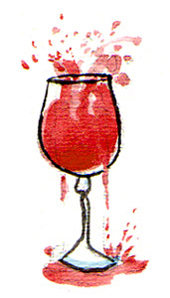Working with Israeli wines, most of them kosher certified, I often hear the question; “what makes a wine kosher?”.
Without getting into too many of the details, I explain that it can not contain an ingredient (gelatin or isinglass) sometimes used in the fining (removing particles) of wine. And it must be made (actually handled) by a sabbath observant Jew.
Another question that inevitably arises relates to a process known as “mevushal” or flash pasteurized. This is a process whereby the wine (or often the juice pre- fermentation) is quickly brought up in temperature to around 180 degrees F and then (usually) quickly cooled.

Wines that have gone through this process can be handled by Jew & Gentile alike and still maintain their kosher status, whereas non-mevushal wines can not be handled by non-Jews lest they risk losing their status as kosher. I find this practice to be highly offensive and will refrain from further comment. Amongst the reasons for said practice dates back to pagan rituals/libations done over wine, but only wine that had NOT been boiled. As such the rabbi’s decreed that all kosher wine be boiled so that Jews would not use pagan wine for their own sacramental purposes.
Many of the better kosher wines today do NOT undergo this flash pasteurization for fear of damaging the wine. And many wine critics believe that the heating of the wine leads to cooked fruit flavors (rather than fresh fruit flavors) and also prevents the wine from aging gracefully as many “mevushal” wines tend to deteriorate within a few years of their vintage date.
I bring this up as I learned something new about flash pasteurized wine today. I found an article written by Bill Zacharkiw in The Montreal Gazette whereby Zacharkiw states “The first time I came across the technique of “flash pasteurization” was when I talked with Tomas Perrin of Château Beaucastel, whose Châteauneuf-du-Pape … (is) considered by many … as … the world’s best.
Beaucastel wines undergo a heating process similar to mevushal wines.
Perrin…believes that by quickly heating and then cooling the grapes, the delicate flavors and aromas are more easily extracted from the grape skins, without all the astringent tannins. Also, this type of pasteurization helps protect the wine from premature oxidation, which means fewer sulphites need to be used.”
Interesting huh?
Happy (dare I say) mevushal wine tasting!
WTG
Warning: Declaration of Social_Walker_Comment::start_lvl(&$output, $depth, $args) should be compatible with Walker_Comment::start_lvl(&$output, $depth = 0, $args = Array) in /home/u640618151/domains/winetastingguy.com/public_html/wp-content/plugins/social/lib/social/walker/comment.php on line 18
Warning: Declaration of Social_Walker_Comment::end_lvl(&$output, $depth, $args) should be compatible with Walker_Comment::end_lvl(&$output, $depth = 0, $args = Array) in /home/u640618151/domains/winetastingguy.com/public_html/wp-content/plugins/social/lib/social/walker/comment.php on line 42
Gary,
Great / scary find. I must rethink this whole process now. A few things: Doesn’t mevushal kind of freeze the wine in time and inhibit aging? Also, upon further review, it makes some sense for this process in a Southern Rhone lend because the baked/stewed fruit is already part of the style. Hmm.
Yeah, forced me to rethink as well.
I’m not sure that flash pasteurization freezes the wine in time, but the “experts” do say that it speeds up the aging process and that “mevushal” wines are not age-worthy.
[…] have blogged before about “mevushal” or flash pasteurized wine. And in general, though the technology is […]